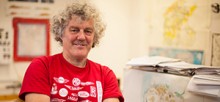“This is one of the reasons you become a geologist if you grew up in the 1980s,” Dr. Matthew McKay said as he displays a video of him standing atop Mt. St. Helens. McKay, associate professor of geology at Missouri State University, mixes old school techniques of mapping and “disappearing into the woods” with the latest technology. It’s a passion, but there’s also important … [Read more...] about Connecting the rocks to tell the Earth’s story
It may erupt suddenly and violently terrorizing the town nearby, setting forth panic and destruction. It might slowly ooze. And another volcano might lay dormant for several more years – centuries even. It’s nearly impossible to predict. That is one of the goals of Dr. Gary Michelfelder’s research. For the last 15 years, Michelfelder, associate professor of … [Read more...] about A big one: Forecasting future volcanic eruptions
Qiu, associate dean of the College of Natural and Applied Sciences and a geospatial sciences faculty member, asked a logical question: Why don’t people spread out more evenly? She imagined streets with less congestion. It felt like the perfect solution. But it’s never quite that simple, she learned. You have to consider infrastructure, landscape, natural resources and … [Read more...] about Connections: Data and real life
"When a house falls into a sinkhole, neighbors clamor for information. They ask if their house is next," said Dr. Doug Gouzie, geology professor at Missouri State University. "It's unimaginable and devastating, but I think they might not really want the answer to that question." Gouzie studies land formations, like sinkholes, and how water forms them. "Your house being … [Read more...] about Sinking suspicions: Predicting future disasters
Dr. Robert Pavlowsky has worked on nearly 100 projects related to water quality in the Ozarks region of southern Missouri and northern Arkansas. He is the director of the Ozarks Environmental and Water Resources Institute, also known as OEWRI, and a distinguished professor of geography. “I’m a geographer. We view the world at different levels.” The institute supports efforts … [Read more...] about Securing natural resources for the Ozarks
What comes to mind? Dr. Judith Meyer, a historical geographer, wants to know how you experience that landscape and why. "I study the sense of place: the meanings people give to the landscape and how those meanings influence our attitudes toward particular places, especially in terms of how we manage them," said Meyer, geography program coordinator in the department of … [Read more...] about A place for meaning
It’s abundant: Approximately 71 percent of the Earth’s surface is covered in water, and 96.5 percent of it is in the oceans. The other 3.5 percent of the water supply fills lakes, streams, ponds and aquifers; forms icecaps and glaciers; and evaporates or exists inside lifeforms — like us. For a resource that is so in-demand, it’s important to consider how long it will … [Read more...] about Trouble under the surface
“This is one of maybe three or four volcanoes in the whole world that when you go up to the crater you can see lava. This one you get to the top and you look down, and yep, there’s a lava lake down there – you can see it bubbling,” Mickus said. “Recently, the floor of the crater has risen 90 feet and there has been stuff shooting out of the volcano.” Mount Erebus is … [Read more...] about Flying south to study the heat in a very cold spot








